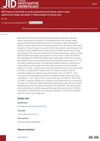 July 2011 in “British Journal of Dermatology”
July 2011 in “British Journal of Dermatology” Dermatologists give better information on pathology forms, hypersensitivity vasculitis is a common skin issue, misdiagnoses can occur, and various skin conditions are linked to loss of elastin or genetic factors.
 September 2024 in “Journal of the American Academy of Dermatology”
September 2024 in “Journal of the American Academy of Dermatology” Baricitinib 4 mg is effective and safe for treating severe alopecia areata.
 April 2023 in “Journal of Investigative Dermatology”
April 2023 in “Journal of Investigative Dermatology” Baricitinib at 2mg and 4mg doses improved work productivity and reduced costs for adults with atopic dermatitis.
 2 citations,
September 2022 in “Dermatologic Therapy”
2 citations,
September 2022 in “Dermatologic Therapy” Tofacitinib is a promising treatment for severe alopecia areata, with many patients experiencing complete or partial hair regrowth.
2 citations,
May 2020 in “JAAD case reports” Ruxolitinib can cause a delayed skin reaction on the nose.
 February 2024 in “Journal of the European Academy of Dermatology and Venereology”
February 2024 in “Journal of the European Academy of Dermatology and Venereology” Baricitinib is effective and safe for long-term use in severe alopecia areata, improving hair regrowth and quality of life with few side effects.
 November 2023 in “JEADV Clinical Practice”
November 2023 in “JEADV Clinical Practice” Patients with severe alopecia areata felt better and less anxious or depressed when treated with baricitinib compared to placebo.
 October 2023 in “Frontiers in Medicine”
October 2023 in “Frontiers in Medicine” Dupilumab helped a 4-year-old grow hair back after another treatment failed.
 July 2022 in “The journal of investigative dermatology/Journal of investigative dermatology”
July 2022 in “The journal of investigative dermatology/Journal of investigative dermatology” Particulate matter causes inflammation in hair cells, potentially harming hair growth.
701 citations,
August 2014 in “Nature medicine” Alopecia areata can be reversed by JAK inhibitors, promoting hair regrowth.
355 citations,
January 2017 in “Journal of the American Academy of Dermatology” JAK inhibitors show promise for treating skin conditions like eczema, hair loss, and psoriasis.
88 citations,
August 2019 in “Frontiers in immunology” Tyrosine kinases are important in skin autoimmune diseases and could be targets for new treatments.
29 citations,
December 2019 in “Expert review of clinical pharmacology” JAK inhibitors are a promising new treatment for hair loss and nail problems in alopecia areata.
15 citations,
January 2023 in “Antioxidants” Oxidative stress plays a significant role in alopecia areata, and new treatments may include JAK inhibitors and antioxidants.
13 citations,
September 2022 in “Frontiers in immunology” Ifidancitinib, a JAK inhibitor, effectively regrows hair in mice with alopecia by tiring out harmful T cells.
13 citations,
January 2020 in “Acta Dermato Venereologica” Ruxolitinib treatment led to unexpected hair regrowth in a patient with alopecia universalis.
 7 citations,
April 2021 in “Journal of advanced pharmaceutical technology & research”
7 citations,
April 2021 in “Journal of advanced pharmaceutical technology & research” The compound 16 from the Merremia peltata plant could potentially be a good treatment for hair loss (alopecia) due to its strong activity and favorable skin absorption.
 6 citations,
August 2023 in “BMC genomics”
6 citations,
August 2023 in “BMC genomics” The study found that genetic differences related to hair growth and other traits help cashmere goats adapt to high-altitude environments.
 6 citations,
May 2023 in “Drugs”
6 citations,
May 2023 in “Drugs” Baricitinib helps regrow hair in adults with severe alopecia better than a placebo and is approved for treatment, but long-term effects are still unknown.
 6 citations,
November 2022 in “Journal of autoimmunity”
6 citations,
November 2022 in “Journal of autoimmunity” JAK inhibitors like tofacitinib may effectively treat Alopecia Areata.
 4 citations,
January 2023 in “Skin health and disease”
4 citations,
January 2023 in “Skin health and disease” Blocking Janus kinase 1 helps stop inflammation and regrow hair, making it a good treatment for hair loss from alopecia areata.
 3 citations,
June 2023 in “Journal of dermatological treatment”
3 citations,
June 2023 in “Journal of dermatological treatment” Regrowing scalp hair improves quality of life and reduces anxiety and depression in severe alopecia areata patients.
 2 citations,
June 2023 in “Indian journal of dermatology, venereology, and leprology”
2 citations,
June 2023 in “Indian journal of dermatology, venereology, and leprology” Janus kinase inhibitors can regrow hair in alopecia areata but may cause side effects and hair loss may return if treatment stops.
2 citations,
February 2023 in “Actas Dermo-Sifiliográficas” Baricitinib effectively improved both atopic dermatitis and alopecia areata symptoms in a patient.
 2 citations,
November 2021 in “ACG Case Reports Journal”
2 citations,
November 2021 in “ACG Case Reports Journal” Tofacitinib successfully treated hair loss in a Crohn's disease patient who previously used adalimumab.
1 citations,
December 2023 in “Molecules/Molecules online/Molecules annual” JAK inhibitors show promise for treating various skin diseases.
 1 citations,
October 2020 in “Journal of Investigative Dermatology Symposium Proceedings”
1 citations,
October 2020 in “Journal of Investigative Dermatology Symposium Proceedings” The summit concluded that new treatments like Jak inhibitors show promise for Alopecia Areata and personalized approaches are needed.
 December 2023 in “Journal of Ayub Medical College Abbottabad”
December 2023 in “Journal of Ayub Medical College Abbottabad” Ritlecitinib effectively treats alopecia areata in patients 12 and older with fewer side effects.

Baricitinib therapy helped many patients with severe alopecia regrow hair after 52 weeks.
 January 2023 in “Indian Dermatology Online Journal”
January 2023 in “Indian Dermatology Online Journal” No single ideal JAK inhibitor for alopecia areata has been determined; JAK3 inhibitors may be promising with fewer side effects.



















